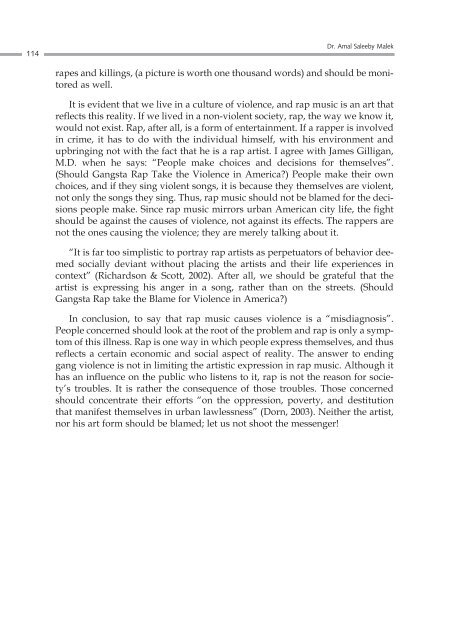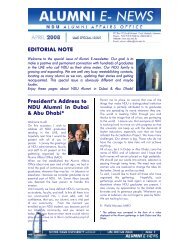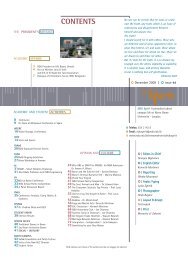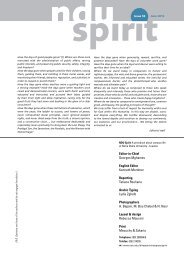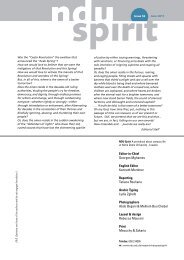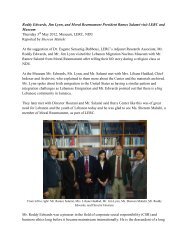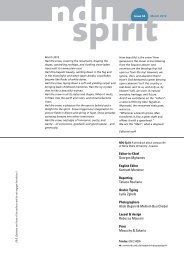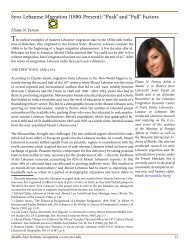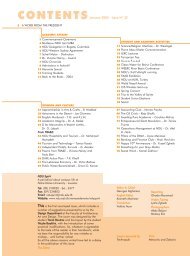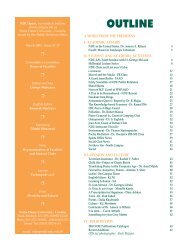Violence in Language: Is Rap Music Causing Violence in America?
Violence in Language: Is Rap Music Causing Violence in America?
Violence in Language: Is Rap Music Causing Violence in America?
Create successful ePaper yourself
Turn your PDF publications into a flip-book with our unique Google optimized e-Paper software.
114<br />
Dr. Amal Saleeby Malek<br />
rapes and kill<strong>in</strong>gs, (a picture is worth one thousand words) and should be monitored<br />
as well.<br />
It is evident that we live <strong>in</strong> a culture of violence, and rap music is an art that<br />
reflects this reality. If we lived <strong>in</strong> a non-violent society, rap, the way we know it,<br />
would not exist. <strong>Rap</strong>, after all, is a form of enterta<strong>in</strong>ment. If a rapper is <strong>in</strong>volved<br />
<strong>in</strong> crime, it has to do with the <strong>in</strong>dividual himself, with his environment and<br />
upbr<strong>in</strong>g<strong>in</strong>g not with the fact that he is a rap artist. I agree with James Gilligan,<br />
M.D. when he says: “People make choices and decisions for themselves”.<br />
(Should Gangsta <strong>Rap</strong> Take the <strong>Violence</strong> <strong>in</strong> <strong>America</strong>?) People make their own<br />
choices, and if they s<strong>in</strong>g violent songs, it is because they themselves are violent,<br />
not only the songs they s<strong>in</strong>g. Thus, rap music should not be blamed for the decisions<br />
people make. S<strong>in</strong>ce rap music mirrors urban <strong>America</strong>n city life, the fight<br />
should be aga<strong>in</strong>st the causes of violence, not aga<strong>in</strong>st its effects. The rappers are<br />
not the ones caus<strong>in</strong>g the violence; they are merely talk<strong>in</strong>g about it.<br />
“It is far too simplistic to portray rap artists as perpetuators of behavior deemed<br />
socially deviant without plac<strong>in</strong>g the artists and their life experiences <strong>in</strong><br />
context” (Richardson & Scott, 2002). After all, we should be grateful that the<br />
artist is express<strong>in</strong>g his anger <strong>in</strong> a song, rather than on the streets. (Should<br />
Gangsta <strong>Rap</strong> take the Blame for <strong>Violence</strong> <strong>in</strong> <strong>America</strong>?)<br />
In conclusion, to say that rap music causes violence is a “misdiagnosis”.<br />
People concerned should look at the root of the problem and rap is only a symptom<br />
of this illness. <strong>Rap</strong> is one way <strong>in</strong> which people express themselves, and thus<br />
reflects a certa<strong>in</strong> economic and social aspect of reality. The answer to end<strong>in</strong>g<br />
gang violence is not <strong>in</strong> limit<strong>in</strong>g the artistic expression <strong>in</strong> rap music. Although it<br />
has an <strong>in</strong>fluence on the public who listens to it, rap is not the reason for society’s<br />
troubles. It is rather the consequence of those troubles. Those concerned<br />
should concentrate their efforts “on the oppression, poverty, and destitution<br />
that manifest themselves <strong>in</strong> urban lawlessness” (Dorn, 2003). Neither the artist,<br />
nor his art form should be blamed; let us not shoot the messenger!


